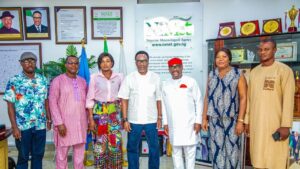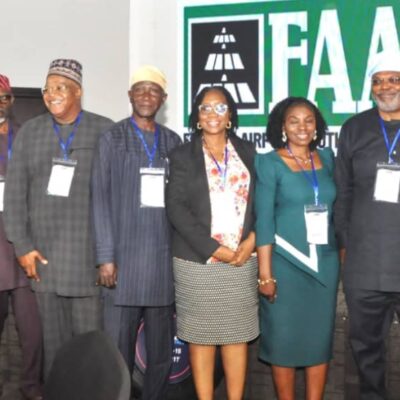
BY OLAPEJU OLUBI
With climate change disrupting weather patterns and altering the natural flow of water systems, the Nigerian Meteorological Agency (NiMet) and the Anambra-Imo River Basin Development Authority (AIRBDA) have opened a new chapter of cooperation aimed at enhancing preparedness and mitigating the adverse effects of climate variability on water resources, agriculture, and livelihoods.
The strategic partnership was the focus of discussions during a visit by Rt. Hon. Emeka Nduka, Managing Director/Chief Executive Officer of AIRBDA, to the headquarters of NiMet in Abuja.
The visit provided a platform for both agencies to explore practical areas of collaboration, especially in the use of climate data and hydrological information to improve planning and decision-making across the southeastern region of Nigeria.
Welcoming the AIRBDA delegation, Professor Charles Anosike, Director General and Chief Executive Officer of NiMet, emphasized the urgent need for synergy between meteorological services and river basin authorities in the face of intensifying climate-related disruptions.
“Climate change is manifesting in the form of shifting rainfall patterns and rising temperatures,” Professor Anosike noted.
“These changes can significantly alter the hydrology of river basins, resulting in increased frequency and intensity of floods or droughts, which threaten livelihoods, critical infrastructure, and food security.”
He stressed that the relationship between meteorology and river basin management is both intricate and vital to national development.
“Meteorological elements such as rainfall and temperature directly influence a basin’s hydrological behavior, while the physical characteristics of river basins can, in turn, shape local weather andN climate patterns,” he explained.
Professor Anosike highlighted NiMet’s Seasonal Climate Prediction (SCP) as a cornerstone of Nigeria’s early warning system, urging wider adoption and application of the SCP by stakeholders involved in agriculture, water resource planning, and disaster risk reduction.
“Our flagship SCP provides vital information that, if effectively utilized, can help policymakers anticipate and respond to weather extremes, especially flood disasters,” he said.
“By strengthening collaboration with agencies like AIRBDA, we can create a more coordinated response to climate threats and foster resilience at the community and regional levels.”
On his part, Rt. Hon. Emeka Nduka lauded NiMet’s professionalism and the quality of its climate services, describing them as indispensable to AIRBDA’s mission of sustainable water resource development and agricultural support in the region.
“We appreciate the warm reception by the NiMet team and are particularly interested in strengthening technical cooperation,” Nduka stated.
“NiMet’s data and forecasts are essential for enhancing our irrigation activities, improving dam operations, and ensuring that we are better prepared for the challenges posed by a changing climate.”
He emphasized the growing relevance of scientific collaboration in managing the impacts of climate variability, noting that shared data and joint expertise would be key in designing adaptive solutions for the southeastern river basin areas.
The meeting concluded with a shared commitment to institutionalize the partnership through a formal Memorandum of Understanding (MoU).
The proposed MoU will serve as a framework for knowledge exchange, capacity building, joint research initiatives, and improved coordination in areas such as flood forecasting, water conservation, and food security planning.
Both agencies affirmed that the partnership would not only enhance operational efficiency but also contribute to broader national goals around climate adaptation, environmental sustainability, and socio-economic development.
“We are confident that this collaboration will deliver long-term benefits to the communities we serve.
“Together, we can build systems that are proactive, data-driven, and resilient in the face of climate uncertainty”, the NiMET boss stated.
Olapeju is a journalist and aviation reporter.





